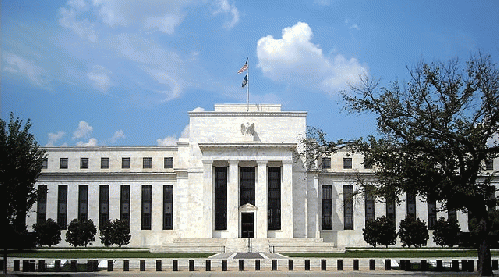The Federal Reserve Building, Washington, D.C. by AgnosticPreachersKid / Own work / Creative Commons 3.0
The bills would eliminate a number of glaring conflicts of interest among figures in the private banking industry and the Fed. Membership on the Fed's boards and its policies on conflicts of interest are widely seen as inappropriate. Not only are top executives of the banking industry disproportionately represented on the Fed's boards, they often select other people to serve on those boards as well. The Fed's role as a regulator of financial institutions is also a problem. Obviously, it is extremely incongruous and illogical to ask people to regulate themselves and the private firms they lead. Worse practices have, however, emerged. Thanks to an amendment by Sanders to the Dodd-Frank Bill, the Fed has now been audited twice by the Government Accountability Office (GAO). The GAO found that members of the Fed's boards are often investors in the very firms that they regulate and bailout. Officials should never stand to profit from decisions made on behalf of taxpayers, especially decisions to allocate hundreds of billions of dollars of the taxpayers' money. These egregious circumstances have been commonplace for some time.
The GAO's unprecedented audits revealed these institutional flaws starkly contrast the policies of our closest allies. On his website, Sanders posted a report on the GAO's second audit. According to the report, contrary to the Fed's officials, central banks' directors in "Australia, Canada, England and the European Union all have to disclose potential conflicts of interest and must disclose [their] conflict of interest policies on the internet." Leading economists also say the Fed's structure deviates from international norms generally. Shahien Nasiripour quoted Joseph Stiglitz, the former chief economist of the World Bank, in the Huffington Post in 2010. Stiglitz said that, if World Bank staff saw an institution in another country that was organized like the Fed, they would deem it a "corrupt governing structure" and undeserving of assistance. The GAO's audits have offered various recommendations to increase the Fed's transparency and the integrity of its organizational structure.
Both Sanders and DeFazio have long defended taxpayers from bailouts, challenging our often secretive and unaccountable financial institutions. A statement on the Senator's website says that, if passed, his bill to fix the Fed would prohibit many conflicts of interest that were cited by the GAO. The act would make the Fed more transparent and independent of the private industry that it regulates. Then-Senate candidate, Elizabeth Warren, and the economic think tank, Demos, endorsed the bill.
The US is in a deep and lasting economic crisis. If major changes are not implemented soon, another phase of the downturn will be inevitable. Action must be taken now to emend our most powerful economic institution according to the advice of our federal auditors. Bernie Sanders, Peter DeFazio, and others have shined a light on the Fed, showing Congress what the next steps should be. Our respective politics and views about the Fed's top officials are irrelevant in this case. One hundred years of glaring conflicts of interest are enough. If we want to finally begin to restore domestic and international confidence in our economy and our monetary policies, we have to pressure all our lawmakers to pass a new version of the Federal Reserve Independence Act.





